
The Absent-Minded Beggar
Encyclopedia
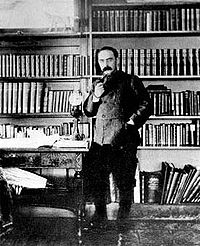
Rudyard Kipling
Joseph Rudyard Kipling was an English poet, short-story writer, and novelist chiefly remembered for his celebration of British imperialism, tales and poems of British soldiers in India, and his tales for children. Kipling received the 1907 Nobel Prize for Literature...
, set to music by Sir Arthur Sullivan and often accompanied by an illustration by Richard Caton Woodville
Richard Caton Woodville
Richard Caton Woodville was an English artist and illustrator, who is best known for being one of the most prolific and effective painters of battle scenes in the late 19th and early 20th centuries.-Biography:...
. The song was written as part of an appeal by the Daily Mail
Daily Mail
The Daily Mail is a British daily middle-market tabloid newspaper owned by the Daily Mail and General Trust. First published in 1896 by Lord Northcliffe, it is the United Kingdom's second biggest-selling daily newspaper after The Sun. Its sister paper The Mail on Sunday was launched in 1982...
to raise money for soldiers fighting in the South African War (sometimes known as the Boer War) and their families. The fund was the first such charitable effort for a war.
The chorus of the song exhorted its audience to "pass the hat for your credit's sake, and pay— pay— pay!" The patriotic poem and song caused a sensation and were constantly performed throughout the war and beyond. Kipling was offered a knighthood shortly after publication of the poem but declined the honour. Vast numbers of copies of the poem and sheet music were published, and large quantities of related merchandise were sold to aid the charity. The "Absent-Minded Beggar Fund" was an unprecedented success and raised a total of more than £250,000.
History
In September 1899, it was clear that the crisis in South Africa was likely to turn into war. By 2 October, all military leave had been cancelled, and urgent preparations were under way to send a large expeditionary force to the Cape, with horses and supplies being requisitioned and mobilised. On 7 October, a proclamation was issued calling out the Army Reserve. Of 65,000 liable men, around 25,000 were intended to be called up for service.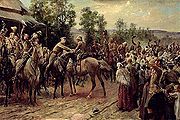
Permanent Employment
Permanent employees or regular employees work for a single employer and are paid directly by that employer. In addition to their wages, they often receive benefits like subsidized health care, paid vacations, holidays, sick time, or contributions to a retirement plan. Permanent employees are often...
for whom returning to military duty meant a significant cut in their income. In addition, there was no contemporary legislation of the time protecting the permanent employment of Reservists. Employers could – and often would – replace them with other workers, with no guarantee that if the soldier returned he would be able to take back his job. As a result, a large number of families were quickly plunged into poverty, since a lifestyle comfortably maintained on a workman's wage of twenty shillings could not be kept up on the infantryman's "shilling a day". As if this were not enough, there was no guarantee that the husband would have a job to return to, even without the prospect of injury or death. A number of charitable funds existed to support these individuals, most notably the Soldiers' and Sailors' Families Association, but a number of private appeals were also made.
Simultaneously, a wave of patriotism was sweeping the country, catered to by jingoist
Jingoism
Jingoism is defined in the Oxford English Dictionary as extreme patriotism in the form of aggressive foreign policy. In practice, it is a country's advocation of the use of threats or actual force against other countries in order to safeguard what it perceives as its national interests...
newspapers such as the Daily Mail
Daily Mail
The Daily Mail is a British daily middle-market tabloid newspaper owned by the Daily Mail and General Trust. First published in 1896 by Lord Northcliffe, it is the United Kingdom's second biggest-selling daily newspaper after The Sun. Its sister paper The Mail on Sunday was launched in 1982...
. Many of these newspapers were also involved in the charitable fundraising efforts to benefit the Reservists and their dependents. The Daily Mail proprietor, Alfred Harmsworth, had publicised efforts to help soldiers and their families. This drew the attention of Rudyard Kipling
Rudyard Kipling
Joseph Rudyard Kipling was an English poet, short-story writer, and novelist chiefly remembered for his celebration of British imperialism, tales and poems of British soldiers in India, and his tales for children. Kipling received the 1907 Nobel Prize for Literature...
, who produced "The Absent-Minded Beggar" on 16 October 1899 and sent the verses to Harmsworth on 22 October with a note that "they are at your service. ... turn [the proceeds] over to any one of the regularly ordained relief-funds, as a portion of your contribution. I don't want my name mixed up in the business except as it will help to get money. It's catchpenny verse and I want it to catch just as many pennies as it can. ... [p.s.] It isn't a thing I shall care to reprint; so there is no need of copyrighting it in America. If any one wants to sing it take care that the proceeds go to our men." By 25 October, Kipling was plotting with Harmsworth on how to maximise the fundraising from the poem by having it recited at music halls. He suggested finding a composer to set it to a "common + catchy" tune.
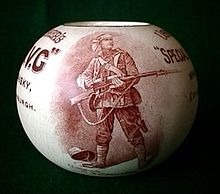
Herbert Beerbohm Tree
Sir Herbert Beerbohm Tree was an English actor and theatre manager.Tree began performing in the 1870s. By 1887, he was managing the Haymarket Theatre, winning praise for adventurous programming and lavish productions, and starring in many of its productions. In 1899, he helped fund the...
, recited it at the Palace Theatre
Palace Theatre, London
The Palace Theatre is a West End theatre in the City of Westminster in London. It is an imposing red-brick building that dominates the west side of Cambridge Circus and is located near the intersection of Shaftesbury Avenue and Charing Cross Road...
, every night before the show, for fourteen months, and other performers recited it at music hall
Music hall
Music Hall is a type of British theatrical entertainment which was popular between 1850 and 1960. The term can refer to:# A particular form of variety entertainment involving a mixture of popular song, comedy and speciality acts...
s and elsewhere, giving part of the profits to the fund. The country's premier composer, Sir Arthur Sullivan, was immediately asked to set the poem to music. Sullivan had written some 20 operas, including fourteen comic operas
Gilbert and Sullivan
Gilbert and Sullivan refers to the Victorian-era theatrical partnership of the librettist W. S. Gilbert and the composer Arthur Sullivan . The two men collaborated on fourteen comic operas between 1871 and 1896, of which H.M.S...
with W. S. Gilbert
W. S. Gilbert
Sir William Schwenck Gilbert was an English dramatist, librettist, poet and illustrator best known for his fourteen comic operas produced in collaboration with the composer Sir Arthur Sullivan, of which the most famous include H.M.S...
, and a large volume of songs, orchestral pieces and other music. Although he was in the middle of composing his next opera, The Rose of Persia
The Rose of Persia
The Rose of Persia; or, The Story-Teller and the Slave, is a two-act comic opera, with music by Arthur Sullivan and a libretto by Basil Hood. It premiered at the Savoy Theatre on 29 November 1899, closing on 28 June 1900 after a profitable run of 211 performances...
(which was to be his last completed opera), Sullivan agreed. Both Kipling and Sullivan declined proffered fees for creating the song. Artist Richard Caton Woodville
Richard Caton Woodville
Richard Caton Woodville was an English artist and illustrator, who is best known for being one of the most prolific and effective painters of battle scenes in the late 19th and early 20th centuries.-Biography:...
, within several days, provided an illustration, titled "A Gentleman in Kharki", showing a wounded but defiant British Tommy
Tommy Atkins
Tommy Atkins is a term for a common soldier in the British Army that was already well established in the 19th century, but is particularly associated with World War I. It can be used as a term of reference, or as a form of address. German soldiers would call out to "Tommy" across no man's land if...
in battle. This illustration was included in "art editions" of the poem and song.
In 1897, Sullivan had agreed to compose music for Rudyard Kipling
Rudyard Kipling
Joseph Rudyard Kipling was an English poet, short-story writer, and novelist chiefly remembered for his celebration of British imperialism, tales and poems of British soldiers in India, and his tales for children. Kipling received the 1907 Nobel Prize for Literature...
's poem Recessional
Recessional (poem)
"Recessional" is a poem by Rudyard Kipling, which he composed on the occasion of Queen Victoria's Diamond Jubilee in 1897. The poem, on the one hand, expresses pride in the British Empire, but, on the other, expresses an underlying sadness that the Empire might go the way of all previous empires...
, but he never completed the song. When asked to set "The Absent-Minded Beggar" to music two years later, Sullivan found Kipling's verses so difficult to set that he told his diary, "if it wasn't for charity's sake, I could never have undertaken the task". Still, the experienced composer completed the music in four days, on 5 November 1899. The first public performance was sung by John Coates
John Coates (tenor)
John Coates was a leading English tenor, who sang in opera and oratorio and on the concert platform. His repertoire ranged from Bach and Purcell to contemporary works, and embraced the major heldentenor roles in Richard Wagner's operas...
, under Sullivan's baton, at the Alhambra Theatre
Alhambra Theatre
The Alhambra was a popular theatre and music hall located on the east side of Leicester Square, in the West End of London. It was built originally as The Royal Panopticon of Science and Arts opening on 18 March 1854. It was closed after two years and reopened as the Alhambra. The building was...
on 13 November 1899, to a "magnificent reception" of an overflowing theatre.
Reception
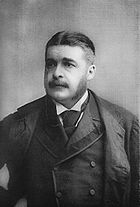
The Daily Chronicle wrote that "It has not been often that the greatest of English writers and the greatest of English musicians have joined inspiring words and stirring melody in a song which expresses the heart feelings of the entire nation". Sullivan's manuscript was later auctioned for £500 towards the fund. Critic Fuller Maitland
John Alexander Fuller Maitland
John Alexander Fuller Maitland was an influential British music critic and scholar from the 1880s to the 1920s. He encouraged the rediscovery of English music of the 16th and 17th centuries, particularly Henry Purcell's music and English virginal music...
disapproved of the composition in The Times, but Sullivan asked a friend, "Did the idiot expect the words to be set in cantata
Cantata
A cantata is a vocal composition with an instrumental accompaniment, typically in several movements, often involving a choir....
form, or as a developed composition with symphonic introduction, contrapuntal treatment, etc.?"
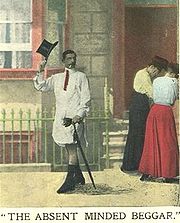
The Daily Mails charitable fund was eventually titled the "Absent Minded Beggar Relief Corps" or the "Absent-Minded Beggar Fund," providing small comforts to the soldiers themselves as well as supporting their families. Among other activities of the Corps, it "met the soldiers on arrival in South Africa, welcomed them on their return to Britain and, more importantly, set up overseas centres to minister to the sick and wounded". The fund raised the unprecedented amount of more than £250,000. The money was not raised solely by the Daily Mail; the poem was publicly available, with anyone permitted to perform or print it in any way, so long as the copyright royalties went to the fund. Newspapers around the world published the poem, hundreds of thousands of copies were quickly sold internationally, and the song was sung widely in theatres and music halls, first being heard in Australia on 23 December 1899. Local "Absent Minded Beggar Relief Corps" branches were opened in Trinidad
Trinidad
Trinidad is the larger and more populous of the two major islands and numerous landforms which make up the island nation of Trinidad and Tobago. It is the southernmost island in the Caribbean and lies just off the northeastern coast of Venezuela. With an area of it is also the fifth largest in...
, Cape Town
Cape Town
Cape Town is the second-most populous city in South Africa, and the provincial capital and primate city of the Western Cape. As the seat of the National Parliament, it is also the legislative capital of the country. It forms part of the City of Cape Town metropolitan municipality...
, Ireland, New Zealand, China, India and numerous places throughout the world; all of this contributed to the fund and to other war efforts, such as the building of hospitals. The fund was the first such charitable effort for a war and has been referred to as the origin of the welfare state. In December, after the first £50,000 was raised, the Daily Mail asserted, "The history of the world can produce no parallel to the extraordinary record of this poem."
The popularity of the poem was such that allusions to it were common. Mark Twain
Mark Twain
Samuel Langhorne Clemens , better known by his pen name Mark Twain, was an American author and humorist...
wrote that "The clarion-peal of its lines thrilled the world". By 18 November, less than a month after publication of the poem, "a new patriotic play" was advertised to open the next week, titled The Absent Minded Beggar, or, For Queen and Country. The same month, the Charity Organisation Society called "The Absent-Minded Beggar" the "most prominent figure on the charitable horizon at present." Even a critical book on the conduct of the war, published in 1900, was titled An Absent-Minded War. Kipling was offered a knight
Knight
A knight was a member of a class of lower nobility in the High Middle Ages.By the Late Middle Ages, the rank had become associated with the ideals of chivalry, a code of conduct for the perfect courtly Christian warrior....
hood within a few weeks of publication of the song but declined, as he declined all offers of State honours. Historian Stephen M. Miller wrote in 2007, "Kipling almost single-handedly restored the strong ties between civilians and soldiers and put Britain and its army back together again."
A performance of "The Absent-Minded Beggar March" on 21 July 1900 at The Crystal Palace
The Crystal Palace
The Crystal Palace was a cast-iron and glass building originally erected in Hyde Park, London, England, to house the Great Exhibition of 1851. More than 14,000 exhibitors from around the world gathered in the Palace's of exhibition space to display examples of the latest technology developed in...
was Sullivan's last public appearance, and the composer died four months later. "The Absent-Minded Beggar" remained popular throughout the three-year war and for years after the war ended It became a part of popular culture of the time, with its title becoming a popular phrase and cartoons, postcards and other humorous representations of the character of the absent-minded beggar becoming popular. The song is performed in John Osborne
John Osborne
John James Osborne was an English playwright, screenwriter, actor and critic of the Establishment. The success of his 1956 play Look Back in Anger transformed English theatre....
's 1957 play The Entertainer
The Entertainer (play)
The Entertainer is a three act play by John Osborne, first produced in 1957. His first play, Look Back in Anger, had attracted mixed notices but a great deal of publicity. Having depicted an "angry young man" in the earlier play, Osborne wrote, at Laurence Olivier's request,about an angry middle...
.
Today the song is still heard on re-issues of early recordings and on post World War II
World War II
World War II, or the Second World War , was a global conflict lasting from 1939 to 1945, involving most of the world's nations—including all of the great powers—eventually forming two opposing military alliances: the Allies and the Axis...
recordings by Donald Adams
Donald Adams
Charles Donald Adams was an English opera singer and actor, best known for his performances in bass-baritone roles of the Savoy Operas with the D'Oyly Carte Opera Company and his own company, Gilbert and Sullivan for All.Adams began his career with the BBC Repertory Company in 1944...
and others. On 19 June 2010, a Kipling conference, called "Following The Absent-minded Beggar" was held at the School of the Humanities of the University of Bristol
University of Bristol
The University of Bristol is a public research university located in Bristol, United Kingdom. One of the so-called "red brick" universities, it received its Royal Charter in 1909, although its predecessor institution, University College, Bristol, had been in existence since 1876.The University is...
, organized by Dr. John Lee, that included lectures and an exhibition of memorabilia and documents relating to the poem and song.
Lyrics
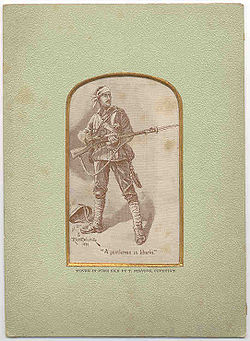
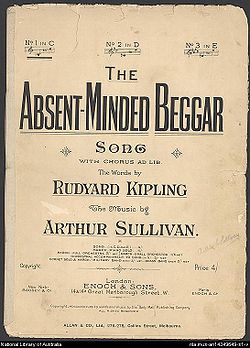
External links
Text and music- Text of "The Absent-Minded Beggar" at Newcastle University
- Facsimile of Sullivan's 1899 manuscript available from the Sir Arthur Sullivan Society
- "The Absent-Minded Beggar", notes with a midi file of the Sullivan music and pdf of the score
- Musical Score of a version of "The Absent-Minded Beggar" with music composed by Esther M. Lewin. State Library of Queensland, Australia
Further information

